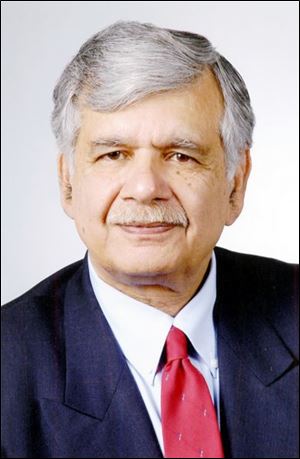
Muslim prayers can't be a substitute for action
12/15/2008THE carnage in Mumbai has brought the menace of global terrorism center stage. For three agonizing days, a handful of fanatics paralyzed a thriving metropolis of 18 million and inflicted an enormous physical and psychological blow on India.

S. Amjad Hussain
As the dust settled, a few facts became evident. The terrorists came by sea from the southern Pakistani city of Karachi. They knew their targets well and, with the help of local accomplices, carried out an intricately choreographed and thoroughly rehearsed script that left 171 people dead, many more injured, and some of the signature buildings of Mumbai in ruins.
The blame game began soon after the first shots rang out. An accusing finger was pointed at Pakistan, and that in turn elicited a knee-jerk response from Pakistanis. A bizarre array of other possibilities was floated that included Israel's secret police, Mossad, and the ultranationalist Hindu political organization Rashtriya Swayamsevak Sangh (RSS), which in 2002 was responsible for a pogrom that killed 2000 Muslims in Gujarat, India.
Amidst the cacophony of charged and contradictory voices, here are a few sober observations.
Pakistan is as much a victim of terrorism as is India. The country is engaged in a fierce struggle with the Taliban in its tribal areas. The Taliban have been increasingly challenging the authority of the Pakistani government in areas that were in government's firm control just a few years ago. The assassination of Benazir Bhutto two years ago and the recent bombing of the Marriott Hotel in the heart of the capital of Islamabad underscore the reach of the terrorists. The Taliban also have been looting at will NATO supply convoys passing through the Khyber Mountains on their way to Kabul.
Sanity has prevailed and the loud voices of ultra-nationalist Hindus demanding a revenge attack on Pakistan have been muted in favor of a coordinated effort against the common enemy. After all, a destabilized Pakistan would be more dangerous for the world than the one that cooperates and coordinates with India. A confrontation between the two nuclear-armed adversaries would throw all of South Asia and the world into a tailspin.
Each time a Mumbai-like incident happens, there is a chorus of demands that moderate Muslims should condemn such atrocities. In all fairness, they do. Soon after the carnage in Mumbai, almost all leading social, political, and religious Muslim organizations in this country (and in Europe as well) categorically condemned the attacks.
What they have failed to do is to isolate terrorists and their evil philosophy from mainstream Islam. Unless they do this, they will not be able to convince the American people that Islam has nothing to do with terrorism. As I argued in my Oct. 6 column ("Muslims should stand up and denounce al-Qaeda"), Muslims should not only denounce terrorism masquerading as religion, but declare the perpetrators outside the pale of Islam.
It is contradictory for Muslim religious leaders to tell the world that Islam is a peaceful religion while they hesitate to excommunicate those who violate the basic principles of the religion. In Mumbai, according to some reports, Muslim clergy made a definitive statement by refusing to conduct funeral services for the terrorists. Unless a clear distinction is made and a rigid separation is created between functional religion of the majority and dysfunctional religion of the terrorists, the whole edifice is liable to be tarred as dysfunctional.
Two years ago, Mahjabeen Islam, an activist Muslim writer from Toledo, proposed Project Friday Khutba, which implored imams to address the subject of terrorism in their Friday sermons. The idea was ridiculed by some leaders and imams with the refrain that they already do that.
So how do we, the Muslims, convince non-Muslim Americans that Islam is a peaceful religion?
Start organizing seminars and symposia on religious terrorism. Have a frank and candid discussion on why terrorists interpret the texts of Qur'an differently from the majority of Muslims.
In this country, except for advocacy organizations like the Council on American Islamic Relations (CAIR), most organizations, whether of national reach or local mosques and Islamic centers, are in a perpetual reactive mode. After every crisis, they react by calling a press conference or issuing a statement of condemnation and then look for the nearest water spigot to perform ablution and pray.
Unfortunately, for many of our leaders prayers have become a convenient substitute for, rather than adjunct to, action. There are doubts and preconceived ideas about Islam in the general public that will not go away by simple condemnation of terrorism.
Dr. S. Amjad Hussain is a retired Toledo surgeon whose column appears every other week in The Blade.
Contact him at: aghaji@bex.net